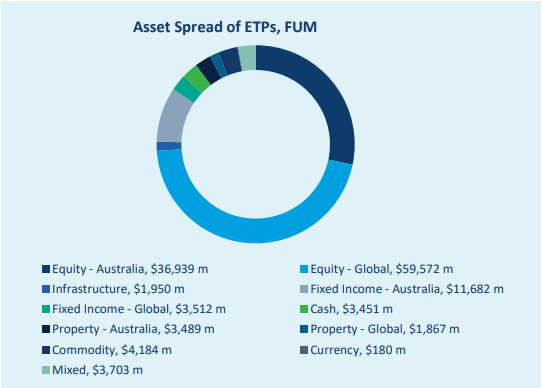The surprising new frontier for ETF investing
While vanilla forms offering exposure to indices like the ASX200, S&P500 and NASDAQ100 have continued to garner the bulk of attention, thematic ETFs also experienced a surge in volumes. Particularly over the COVID-19 pandemic as investors looked for broad exposure to key themes such as automation or cybersecurity that were becoming essential to life. So where might the next big thing for ETFs come from? The answer looks a bit more traditional and might surprise you.
Fixed income.
Fixed income is a less popular asset class across investment products. It is usually viewed as more difficult to understand and there hasn’t been a large number of fixed income ETFs, particularly when compared to equity ETFs. That might all be about to change – and the opportunity in fixed income markets could be why.
The year of fixed income
Fixed income had a tough 2022. Bonds were heavily sold off in the early part of the year with major indices showing unusually high correlation to equity markets. It’s been highly volatile as investors responded to persistently high inflation and the efforts of central banks to dampen it through interest rate rates.
2023 could be different.
Most economists are tipping for a recession of sorts, or at a minimum, tougher economic conditions. Higher global interest rates should be starting to translate to more encouraging returns in fixed income as markets have started to normalise.
“In 2023, our return expectations for fixed income have significantly increased compared to a year ago. Thanks to higher starting interest rates as a result of central banks around the world working to quell persistent inflation, we forecast global bonds to return 3.9-4.9 per cent and domestic bonds to return 3.7-4.7 per cent over the next decade, a 2-percentage point increase,” said Minh Tieu, Vanguard’s Head of ETF Capital Markets, Asia-Pacific.
Fixed income is having a comeback – and ETFs could be along for the ride.
ETFs and fixed income
The lion's share of flows and funds under management indisputably belong to the equities space. To be fair, that’s not just true of ETFs but of most investment products. It makes sense too – equities are generally easier for time-poor investors to understand, research and trade.
ETFs could be the solution to that ease of use though. Quick diversified access to major bond index investments with accompanying yield entitlements and the ability to trade in or out in your standard trading platform could be quite appealing for many.
Approximately 16.7% of the ASX-listed ETFs are in the fixed income space, with 27 directed to Australian fixed income and 19 towards global. In fact, 9 of these were released in the last two years which could be taken as an indication of the potential that fund managers are seeing in this space.
Currently ETF assets under management in the fixed income space stands at $15.19 billion. It’s a tiny fraction of the total $130.44 billion assets under management.

Investors may be starting to appreciate the value of fixed income ETFs in their portfolio and recognising the prospects for the coming year.
“We saw the beginning of increased demand for fixed income ETFs in late 2022 and expect investor interest to grow as this new year unfolds,” says Tieu.
Fixed income ETFs saw a 15.8% increase in funds under management in December compared to the previous year, along with a 4.4% jump compared to November 2022. Global bonds were the biggest beneficiary of flows in late 2022 but on the whole, domestic bonds had the greatest increase year-on-year at 65% increase. According to Vanguard, domestic bond ETFs recorded $2.8 billion in cash flows in 2022, compared to $1.7 billion in 2021.
Investing in fixed income ETFs
The two biggest Australian fixed income ETFs are the Vanguard Australian Fixed Interest Index ETF (ASX: VAF) with $1.5 billion in FUM and iShares Core Composite Bond ETF (ASX: IAF) with $1.77 billion in funds under management.
The two biggest global fixed income ETFs are currency hedged. This is worth noting as investors are obviously conscious of mitigating the affects of exchange rates on returns for fixed income.
Vanguard International Fixed Interest Index (Hedged) ETF (ASX: VIF) has $703.88 million in funds under management while Vanguard Global Aggregate Bond Index (Hedged) ETF (ASX: VBND) has $638.02 million in funds under management.
Bearing in mind that 2022 was a tough year for performance, Livewire’s fund tool shows only three fixed income ETFs generated a positive return for calendar year 2022. They were all Australian fixed income.
- In the “Fund type” box, select “ETFs”
- In “Asset Class”, select “Fixed Income – Australian” and “Fixed Income – Global”
- We then sorted the results based on 1-year returns and excluded the cash ETFs.
Important: We have only covered the ETFs under Livewire’s umbrella. Thus, it doesn’t represent the entirety of the market. Fund performances are also generally viewed over longer timeframes. Of this year’s top five property funds, three have been around for at least five years and one has just reached five years this month. This information is also purely for information purposes and is not intended as advice. Past performance is not a reliable indicator of future return.
The top three fixed income ETFs by 1-year performance:
- VanEck Australian Floating Rate ETF (ASX: FLOT) - 1.05%
- BetaShares Australian Bank Senior Floating Rate Bond ETF (ASX: QPON) - 0.98%
- VanEck Australian Subordinated Debt ETF (ASX: SUBD) - 0.20%
Will you be investing in fixed income ETFs in 2023?
Never miss an insight
If you're not an existing Livewire subscriber, you can sign up to get free access to investment ideas and strategies from Australia's leading investors.
And you can follow my profile to stay up to date with other wires as they're published – don't forget to give them a “like”.
3 topics
7 stocks mentioned
7 funds mentioned

